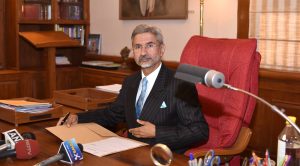At a recent commemorative lecture, India’s External Affairs Minister, S. Jaishankar, offered glimpses into the shifting sands of contemporary Indian foreign policy as practiced and postured by the Narendra Modi-led government since 2014. What follows is an assessment and interpretation of that talk, reinforced with the author’s understanding of the successes and fault-lines in Indian diplomacy.
Arguing strongly for a recalibration of Indian grand strategy that takes into consideration the rapid geopolitical transformation that is sweeping across the globe, it is quite clear that high priest of Indian foreign policy is a risk-taker and wants to reform the way India engages with the rest of the world. India has generally been viewed in the international arena as a status quo power with an inclination to conduct its foreign policy with an element of constancy and restraint.
This was seen in its comfort with rebranding its core idea of ‘non-alignment’ as ‘strategic autonomy’ in the post-Cold War era, and taking its own time to decide who its adversaries, competitors, or partners were. Fresh ideas are essential to usher-in change and Jaishankar interestingly cautions against excessive consistency, caution and the “dogmas of Delhi.”
Benchmarking form and process against outcomes, he gently dismantled the “wisdom of the entrenched,” arguing instead that “purposeful pursuit of national interests” and “hard headed assessments of contemporary geopolitics” have yielded better dividends for India in the past. Speaking a confident and interwoven language seldom heard from an Indian foreign policy mandarin in recent times, Jaishankar acknowledged the importance of ‘hard security,’ disruptive abilities’ and ‘realism,’ and the need to introspect on several shortcomings in the conduct of Indian foreign policy over the years.
Cautioning against being held hostage by history and yet being able to extract the right lessons from it, Jaishankar deconstructs the journey of Indian foreign policy into six phases with all its accompanying successes and warts. Terming the period of 1947-1962 as “an era of optimistic non-alignment,” he suggested that a mismatch between capability and aspiration led to the end of this phase with India’s military defeat at the hands of China.
He argued that India took decisive calls between 1962-1971, whether it was an initial leaning towards the U.S for military assistance, or a strategic shift towards the Soviet Union when pushed into a corner by serious security implications following the 1965 war with Pakistan. Regional assertiveness and robust deterrence marked the next two decades beginning with the creation of Bangladesh in 1971, occupation of the Saltoro Ridge and the Siachen Glacier in 1984, a confident and capability-driven response to Chinese assertiveness in Arunachal Pradesh in 1986-87; the “misadventure in Sri Lanka between 1987-1990,” and the timely military intervention in the Maldives to foil a coup against President Gayoom in 1988.
The fourth era was marked by the collapse of the Soviet Union and the recalibration of Indian foreign policy, for the first time, not under the guidance of the Nehruvian legacy, but driven by a collective wisdom between 1991-1998 from leaders like Prime Ministers Narasimha Rao and Atal Behari Vajpayee who defined India’s economic revival and its nuclear coming-of-age respectively. Balancing and hedging comes with a recognition that in the absence of adequate power, but with a demonstrated potential, nation-states like India can emerge as swing-states in a world order that is searching for an equilibrium between bipolarity and multi-polarity.
With all trends pointing at the latter as a most-probable end state, Jaishankar argued forcefully that India must demonstrate the same vigor that it displayed in sticking to non-alignment in the previous century while stitching new partnerships based on common interests rather than ideological constructs. Only then, he argued, will it be able to emerge as a leading power.
What does India need to do differently to reform, and not necessarily reinvent, the conduct of diplomacy in the twenty first century? For starters, the minister argued for “greater realism in policy,” and a recognition of the “harsher realities of hard security,” after being repeatedly caught napping on the Pakistan front in terms of not recognizing the domination of the Pakistani Deep State in every facet of bilateral relations, especially in its use of terrorism as a legitimate instrument of statecraft against India.
Jaishankar was more ambiguous about China as he stayed away from reading too much into the periodic face-offs across contested frontiers beyond suggesting that previous political dispensations may not have attached as much of importance to securing borders as they ought to have. By suggesting that as much as India recognizes China’s ominous and growing power differential and searches for common ground and potential for partnership, it will retain its eye on the security dimension and strengthen partnerships that offer it some amount of balancing potential.
Suggesting that the various possibilities to solve the boundary issue are very much on the cards, he articulated that an urgency in moving forward on that issue would reflect India’s seriousness about the outcomes of its border management strategies. Urging “diligence, debate, honest review of performance and the introduction of timely correctives, complemented by risk taking abilities,” he summed up his talk by stating, “A nation that has aspiration to become a leading power someday cannot continue with unsettled borders, an unintegrated region and under-exploited opportunities.”
Will this be a bridge too far, or will the Modi-Jaishankar team deliver, is a question mark that looms large over the Indian strategic landscape.
Arjun Subramaniam is a retired Air Vice Marshal from the Indian Air Force, a strategic commentator and a military historian. He is currently a Visiting Professor at Ashoka University.

































